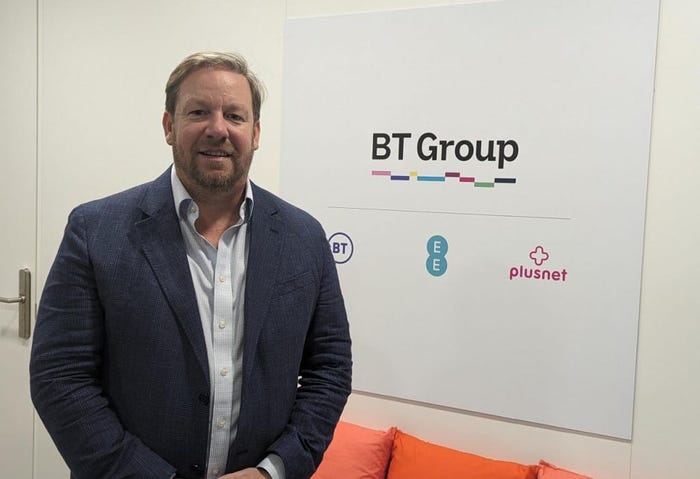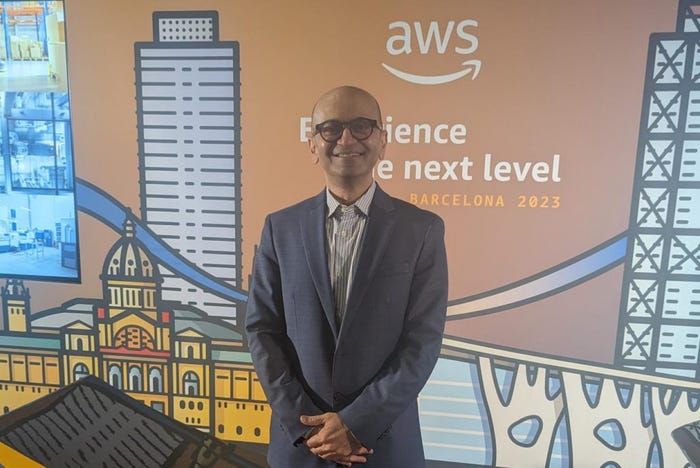Will telcos evolve into new types of business? Will tweaks to the business model more or less maintain the status quo, or will big tech start to swallow the sector up?
March 7, 2023

Will telcos evolve into new types of business? Will tweaks to the business model more or less maintain the status quo, or will big tech start to swallow the sector up? It feels like change is in the air, but that can take many forms.
One of the key themes of MWC 2023 appeared to be the merging, or increasing intertwining, of the telco and wider tech industry – the latter of which certainly seemed to have a larger presence at the show than ever.
Sometimes this merging is focused on MNOs moving aspects of their operations over to public cloud providers like AWS or Microsoft Azure, other times it seems to be about collaborative new tech such as edge computing deployments in concert with private 5G networks, and other times it seems to be about opening the networks to developers through APIs.
These are all distinct trends and there are other ways in which the lines between big Silicon Valley tech firms, regional operators and kit vendors are blurring – but at the show we didn’t hear anyone from any of these camps deny the broader interconnecting phenomenon was happening. Indeed, some seem to think it’s vital.
The rise of network APIs in telecoms
One of the most talked about things at the show was the concept of network APIs, or opening up the networks to allow software developers to create new functions and processes on them. This in itself represents a meeting of the worlds of CSPs and software developers.
The GSMA itself announced the Open Gateway Initiative at the event, which is supposed to be about creating some standards around how this is done. It’s members include telcos like Telefonica, Vodafone and Orange, and it will apparently be promoted by Microsoft at its Ignite and Build events. as well as AWS’s re:Invent.
Lara Dewar, CMO, GSMA told us: “I think that’s part of the reason why the Open Gateway Initiative is so important. Big Tech and telcos need to be working together. Collaboration and partnership is not an optional thing for us to have. They’re becoming so intertwined.”
Of course, it’s easy to say APIs and a more software based approach to networks will bring innovation and agility to networks, but it’s not always obvious what that specifically might mean. When asked for an example, Greg McCall, Chief Networks Officer at BT (pictured below) told us:
“Probably the best example that I could think of is, if you think about our network, and the number of devices that connect to our network, is there an opportunity for us to expose location to a more granular level? So that especially in the enterprise use case where it is devices connected rather than people, there’s probably not as much sensitivity around it. And we can then pinpoint where a device is, how long it’s been active for where it’s gone, where it’s moved – what opportunities might give us in the enterprise space? And if we can expose that API, there’s lots of companies that might find good use cases around location, and to be able to do that.”

What is the future role of the telco in 5G deployments?
HPE is leaning into the private 5G market and that in itself could be seen as indicative of how the line between big tech and telecoms appears to be shrinking, and it does raise questions as to who will do what with so many different types of company now operating in the space. Richard Band, Solution Lead Mobile Core and 5G at the firm told us in a recent interview that big tech and telecoms will come together, but that ‘the question is what is the role of the telco in this in this market’.
Another suggested evolution of the industry is that telcos become more software orientated in order to capitalise on the business opportunities of the future.
“You see a digital transformation in enterprise, manufacturing, healthcare, retail, you name it, it’s happening,” said Andrew Vaz, VP of products, Dell Technologies Telecom Systems Business (pictured below). “And they need the telecoms operators as partners to help do things. It might be hosting an edge cloud if they’re not using a hyperscaler, it could be offering mobile connectivity, 5G connectivity to actually interconnect their disparate sites, or offer private to public mobility for different types of use cases. This is starting… and telecom operators need to re-architect their networks in a much more software defined, agile way to offer these new use cases as well.”

Telco group Orange, who works with both of these firms, and presents a more robust vision of CSP centricity to the evolving business, perhaps unsurprisingly. Laurent Leboucher, SVP, Orange Innovation Networks (pictured below) said when asked if the Big Tech and telco sectors are merging: “To some extent yes, to some extent no. Yes, because in fact they provide a new key enabler, which is the cloud, that we potentially can use – not everywhere, because there are also some critical requirements that we need to fulfil for the public network like sovereignty requirements in some countries, which are not so easy. Which would prevent us from bringing our public core network immediately to public cloud.
“However there are some workloads that we can bring to the public cloud. So they will become a partner, like any other partner. So today we buy infrastructure from Dell, HP, from others to implement our own infrastructure – but we can use their own infrastructure. That doesn’t mean that they will run and they will build our network, we will still keep our responsibility to integrate and operate the network… for instance what we’re doing with AWS, it always brings the cloud, the hybrid cloud – that’s all. We are charged with it, we integrate the private network, we operate private network. And it will stay like that.”

Telecoms as a service?
Speaking of AWS, Ishwar Parulkar, Chief Technologist for AWS Telco Industry (pictured below) told us he sees the future of telcos adopting a ‘as a service’ model, moving away from hardware and pivoting more towards agile, software based businesses. “It opens up a very new way of building and offering networks and connectivity. If you look at what the cloud is at a very 100,000 foot level, it’s a very large scale global infrastructure with multiple tenants, a lot of people using the same thing. And a network is essentially the same.
“But it’s been super static, very static, over provisioned, very slow to move and change. All of that starts changing, so it becomes more dynamic, more agile. You can build a developer ecosystem around people who can develop applications directly to the network, just like it’s the cloud. And it just opens up a very different way of consuming the network. Just like you consume compute storage in the cloud. So to me, that’s a fundamental shift, and if you fast forward now a little bit, you would see a very different telco in 10 years.
“You would see models like SAS models… think of the network being offered like that, network as a service. You would have the network components being offered as a SAS, and Nokia is already starting to look at that. Once you start running these network components on the cloud, they can offer it as a SAS, so it changes their business models as well. instead of building these appliances that they used to, they will be offering SAS type of offerings to telcos. So what you would see is a very different telco – essentially very lean, very dynamic, very agile, a big developer ecosystem around in developing to the network and building network services. Just like today gaming companies build apps on the platform, you would have people building network services.”

Collaboration
What all these comments have in common is that to some extent they all foresee changing business models for telcos on the horizon – but what form that might take is far from certain. On the CSP side, Orange phrased the relationship with Big Tech as all about collaboration but with the telco remaining central, while Dell and AWS suggested the entire networks need to be reconceived as software (which itself could mean a lot of things), and HPE seemed to imply the roles of operators as core players in certain areas in telecoms is perhaps not a given.
Many operators routinely make the point that the costs of rolling out new infrastructure is huge, and some basically seem to be saying its unsustainable since they can’t/haven’t charged consumers a premium for 5G – which to put it another way surely just means the business model as it stands isn’t working.
A solution the EU and many European operators put forward is that the Big Tech firms, who make lots of money on internet services, should simply cough up some cash to the CSPs, and therefore it would remain profitable for the operators to build the towers. Maybe that will happen, but such a thing would seem to be very difficult to enforce.
Operators also seem to be haunted by the thought of becoming ‘dumb pipes’, and many of them have attempted to diversify out of just selling connectivity either through pricy media M&A, or becoming more software and innovation led themselves – turning themselves into what is sometimes called ‘techcos’.
In this sense, the idea seems to be about emulating what Big Tech does and how it does it, but there doesn’t seem to be overwhelming evidence this has yielded much in the way of big wins so far.
Perhaps future growth will come from more collaboration, which is certainly how players like Orange categorise the relationship between big tech and the telco space. Networks will perhaps get somehow more profitable for operators via technology or subsidization, upgrades and maintenance will no longer be a thorn in their sides, and they can leverage their customer relationships to roll in other firms to offer combined services or products.
Assimilation
Another possibility is that firms like HPE, AWS and Microsoft, and a host of other Big Tech entities get increasingly involved and invested in the businesses of selling connectivity in the years to come, and it’s possible that MNOs, many of which are in the process of selling off the actual infrastructure that stitches this together to ‘towercos’ (and then renting them back), have a diminished role.
Whatever the justifications for doing so at the time – and they may all stand up on a case by case basis – it is harder to be certain of what the essential, irreplaceable role of operator is in the future if much of their operations are now housed within the hyperscaler’s cloud platforms, they don’t own the towers, and the networks increasingly become ‘softwarised’ or ‘virtualised’.
That’s not to say Microsoft is going to start selling phone contracts all of a sudden, but we are talking about future networks which are far from defined – ask ten people what 6G will be and you’ll probably get ten different answers. However what everyone seems to agree on is that the way the MNOs are currently set up, its hard to make a lot of money doing what they are doing – surely at some point that means something has to give.
And on the kit side, if Open RAN does become as big as its proponents predict, the centrality of firms like Nokia and Ericsson is also less of a given as other tech firms move in to build out towers piecemeal. Indeed, that’s sort of the point of Open RAN. Furthermore, Light Reading recently quoted BT’s CTO Howard Watson apparently ruling out any large scale 5G-like equipment rollout when 6G comes around, which is how the kit vendors make a lot of their revenue.
Of course, the PR front is all about glorious symbiosis between Big Tech and telcos, and perhaps that’s what it is. But as the saying goes, change, like death and taxes, is the only thing that’s certain. Once upon a time Nokia made its money by selling phones to consumers (the pervasive memory of which has apparently prompted its rebrand last week), Amazon sold paperback novels, and BT was an arm of the Post Office – but here they all are now.
Who is involved in the selling of connectivity services in even five-years-time will surely be very different to the dynamic we have now. The fortunes and influence of companies within any industry can always grow, reduce, or be removed entirely – but if there is one thing you can say about big tech, it’s that it has both a knack and a hunger for disruption.
Get the latest news straight to your inbox. Register for the Telecoms.com newsletter here.
About the Author(s)
You May Also Like








.png?width=300&auto=webp&quality=80&disable=upscale)


_1.jpg?width=300&auto=webp&quality=80&disable=upscale)


.png?width=800&auto=webp&quality=80&disable=upscale)